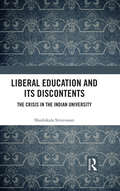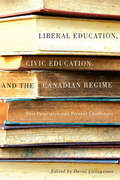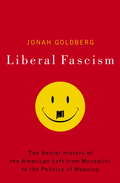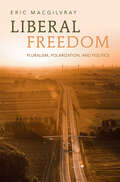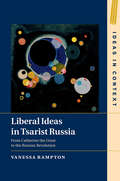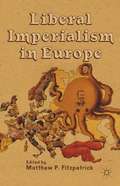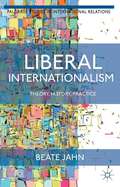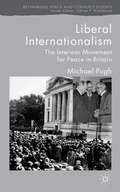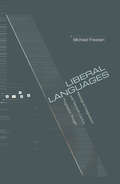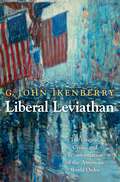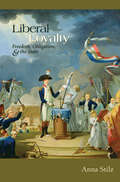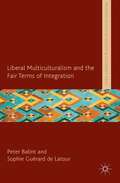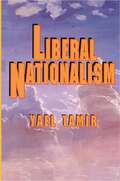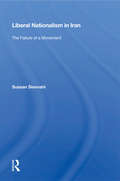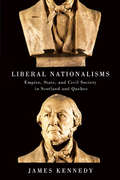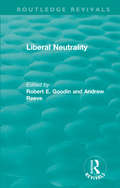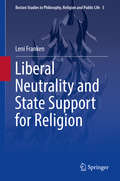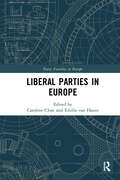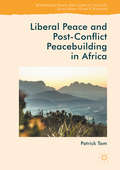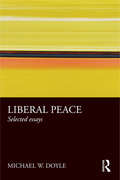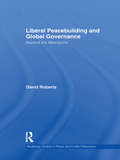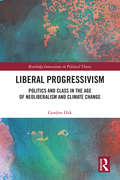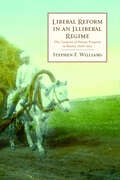- Table View
- List View
Liberal Education and Its Discontents: The Crisis in the Indian University
by Shashikala SrinivasanWhat explains the peculiar trajectory of the university and liberal education in India? Can we understand the crisis in the university in terms of the idea of education underlying it? This book explores these vital questions and traces the intellectual history of the idea of education and the cluster of concepts associated with it. It probes into the cultural roots of liberal education and seeks to understand its scope, effects and limits when transplanted into the Indian context. With an extensive analysis of the philosophical writing on the idea of university and education in the West and colonial documents on education in India, the book reconstructs the ideas of Gandhi and Tagore on education and learning as a radical alternative to the inherited, European model. The author further reflects upon how we can successfully deepen liberal education in India as well as construct alternative models that will help us diversify higher learning for future generations. Lucid, extensive and of immediate interest, this book will be useful for scholars and researchers interested in the history and philosophy of education and culture, social epistemology, ethics, postcolonial studies, cultural studies and public policy.
Liberal Education, Civic Education, and the Canadian Regime: Past Principles and Present Challenges
by David W. LivingstoneShortly after Canadian confederation, Thomas D'Arcy McGee proclaimed that education was "an essential condition of our political independence" and that its role was to form citizens for the new regime. Comparing this idea of education for citizenship, or civic education, to the modern goals of education, Liberal Education, Civic Education, and the Canadian Regime explores the founders' principles, their sources, and the challenges that threaten their vision for Canada. The collection's first essays analyze the political thought of early Canadians such as Brown, McGee, Ryerson, and Bourinot, while later chapters examine enduring principles of liberal democracy derived from Aristotle, de Tocqueville, and Hobbes. The final chapters bring the discussion forward to such topics as the decline of Canadian Catholic liberal arts colleges and the emerging role of our Supreme Court as a self-appointed "moral tutor." Moreover, as it deals with the changing roles of universities in contemporary Canada, Liberal Education, Civic Education, and the Canadian Regime engages current debates about the value and place of a traditional liberal education and the consequences of turning our back on the concepts that inspired our founding leaders. Considering whether Canada’s early documents and traditions can revive past debates and shed light on contemporary issues, this highly original collection presents education as an essential condition of our independence and asks whether current educational principles are threatening Canadians’ capacity for self-government.
Liberal Education, Civic Education, and the Canadian Regime: Past Principles and Present Challenges
by David W. LivingstoneShortly after Canadian confederation, Thomas D'Arcy McGee proclaimed that education was "an essential condition of our political independence" and that its role was to form citizens for the new regime. Comparing this idea of education for citizenship, or civic education, to the modern goals of education, Liberal Education, Civic Education, and the Canadian Regime explores the founders' principles, their sources, and the challenges that threaten their vision for Canada. The collection's first essays analyze the political thought of early Canadians such as Brown, McGee, Ryerson, and Bourinot, while later chapters examine enduring principles of liberal democracy derived from Aristotle, de Tocqueville, and Hobbes. The final chapters bring the discussion forward to such topics as the decline of Canadian Catholic liberal arts colleges and the emerging role of our Supreme Court as a self-appointed "moral tutor." Moreover, as it deals with the changing roles of universities in contemporary Canada, Liberal Education, Civic Education, and the Canadian Regime engages current debates about the value and place of a traditional liberal education and the consequences of turning our back on the concepts that inspired our founding leaders. Considering whether Canada’s early documents and traditions can revive past debates and shed light on contemporary issues, this highly original collection presents education as an essential condition of our independence and asks whether current educational principles are threatening Canadians’ capacity for self-government.
Liberal Fascism: The Secret History of the American Left, from Mussolini to the Politics of Meaning
by Jonah Goldberg"Fascists," "Brownshirts," "jackbooted stormtroopers"--such are the insults typically hurled at conservatives by their liberal opponents. Calling someone a fascist is the fastest way to shut them up, defining their views as beyond the political pale. But who are the real fascists in our midst?Liberal Fascism offers a startling new perspective on the theories and practices that define fascist politics. Replacing conveniently manufactured myths with surprising and enlightening research, Jonah Goldberg reminds us that the original fascists were really on the left, and that liberals from Woodrow Wilson to FDR to Hillary Clinton have advocated policies and principles remarkably similar to those of Hitler's National Socialism and Mussolini's Fascism.Contrary to what most people think, the Nazis were ardent socialists (hence the term "National socialism"). They believed in free health care and guaranteed jobs. They confiscated inherited wealth and spent vast sums on public education. They purged the church from public policy, promoted a new form of pagan spirituality, and inserted the authority of the state into every nook and cranny of daily life. The Nazis declared war on smoking, supported abortion, euthanasia, and gun control. They loathed the free market, provided generous pensions for the elderly, and maintained a strict racial quota system in their universities--where campus speech codes were all the rage. The Nazis led the world in organic farming and alternative medicine. Hitler was a strict vegetarian, and Himmler was an animal rights activist.Do these striking parallels mean that today's liberals are genocidal maniacs, intent on conquering the world and imposing a new racial order? Not at all. Yet it is hard to deny that modern progressivism and classical fascism shared the same intellectual roots. We often forget, for example, that Mussolini and Hitler had many admirers in the United States. W.E.B. Du Bois was inspired by Hitler's Germany, and Irving Berlin praised Mussolini in song. Many fascist tenets were espoused by American progressives like John Dewey and Woodrow Wilson, and FDR incorporated fascist policies in the New Deal.Fascism was an international movement that appeared in different forms in different countries, depending on the vagaries of national culture and temperament. In Germany, fascism appeared as genocidal racist nationalism. In America, it took a "friendlier," more liberal form. The modern heirs of this "friendly fascist" tradition include the New York Times, the Democratic Party, the Ivy League professoriate, and the liberals of Hollywood. The quintessential Liberal Fascist isn't an SS storm trooper; it is a female grade school teacher with an education degree from Brown or Swarthmore.These assertions may sound strange to modern ears, but that is because we have forgotten what fascism is. In this angry, funny, smart, contentious book, Jonah Goldberg turns our preconceptions inside out and shows us the true meaning of Liberal Fascism.
Liberal Freedom: Pluralism, Polarization, and Politics
by Eric MacGilvrayWe seem to be losing the ability to talk to each other about – and despite – our political differences. The liberal tradition, with its emphasis on open-mindedness, toleration, and inclusion, is ideally suited to respond to this challenge. Yet liberalism is often seen today as a barrier to constructive dialogue: narrowly focused on individual rights, indifferent to the communal sources of human well-being, and deeply implicated in structures of economic and social domination. This book provides a novel defense of liberalism that weaves together a commitment to republican self-government, an emphasis on the value of unregulated choice, and an appreciation of how hard it is to strike a balance between them. By treating freedom rather than justice as the central liberal value this important book, critical to the times, provides an indispensable resource for constructive dialogue in a time of political polarization.
Liberal Ideas in Tsarist Russia: From Catherine the Great to the Russian Revolution (Ideas in Context #126)
by Vanessa RamptonLiberalism is a critically important topic in the contemporary world as liberal values and institutions are in retreat in countries where they seemed relatively secure. Lucidly written and accessible, this book offers an important yet neglected Russian aspect to the history of political liberalism. Vanessa Rampton examines Russian engagement with liberal ideas during Russia's long nineteenth century, focusing on the high point of Russian liberalism from 1900 to 1914. It was then that a self-consciously liberal movement took shape, followed by the founding of the country's first liberal (Constitutional-Democratic or Kadet) party in 1905. For a brief, revelatory period, some Russians - an eclectic group of academics, politicians and public figures - drew on liberal ideas of Western origin to articulate a distinctively Russian liberal philosophy, shape their country's political landscape, and were themselves partly responsible for the tragic experience of 1905.
Liberal Imperialism in Europe
by Matthew P. FitzpatrickIn this state-of-the-field anthology, leading scholars in the fields of European imperial history and intellectual history explore the nature of European imperialism during the 'long nineteenth century', scrutinizing the exact relationship between the various forms of liberalism in Europe and the various imperial projects of Europe.
Liberal Internationalism
by Beate JahnThis study provides an original conception of liberalism that accounts for its internal contradictions and explains the current crisis of liberal internationalism. Examining the disjuncture between liberal theory and practice, it offers a firmer grasp on the historical role of liberalism in world politics.
Liberal Internationalism: The Interwar Movement for Peace in Britain (Rethinking Peace and Conflict Studies)
by Michael C. PughThe book investigates the role of popular liberal internationalism as a social movement in Britain using Gramscian and Foucauldian ideas of civil society. It addresses the use of force for peace through an examination of the impact of civil society actors in popular liberal internationalism between the world wars.
Liberal Languages: Ideological Imaginations and Twentieth-Century Progressive Thought
by Michael FreedenLiberal Languages reinterprets twentieth-century liberalism as a complex set of discourses relating not only to liberty but also to welfare and community. Written by one of the world's leading experts on liberalism and ideological theory, it uses new methods of analyzing ideologies, as well as historical case studies, to present liberalism as a flexible and rich tradition whose influence has extended beyond its conventional boundaries. Michael Freeden argues that liberalism's collectivist and holistic aspirations, and its sense of change, its self-defined mission as an agent of developing civilization--and not only its deep appreciation of liberty--are central to understanding its arguments. He examines the profound political impact liberalism has made on welfare theory, on conceptions of poverty, on standards of legitimacy, and on democratic practices in the twentieth century. Through a combination of essays, historical case studies, and more theoretical chapters, Freeden investigates the transformations of liberal thought as well as the ideological boundaries they have traversed. He employs the complex theory of ideological analysis that he developed in previous works to explore in considerable detail the experimental interfaces created between liberalism and neighboring ideologies on the left and the right. The nature of liberal thought allows us to gain a better perspective on the ways ideologies present themselves, Freeden argues, not necessarily as dogmatic and alienated structures, but as that which emanates from the continuous creativity that open societies display.
Liberal Leviathan: The Origins, Crisis, and Transformation of the American World Order (Princeton Studies in International History and Politics #141)
by G. John IkenberryA new vision for the American world orderIn the second half of the twentieth century, the United States engaged in the most ambitious and far-reaching liberal order building the world had yet seen. This liberal international order has been one of the most successful in history in providing security and prosperity to more people. But in the last decade, the American-led order has been troubled. Some argue that the Bush administration, with its war on terror, invasion of Iraq, and unilateral orientation, undermined this liberal order. Others argue that we are witnessing the end of the American era. Liberal Leviathan engages these debates.G. John Ikenberry argues that the crisis that besets the American-led order is a crisis of authority. A political struggle has been ignited over the distribution of roles, rights, and authority within the liberal international order. But the deeper logic of liberal order remains alive and well. The forces that have triggered this crisis—the rise of non-Western states such as China, contested norms of sovereignty, and the deepening of economic and security interdependence—have resulted from the successful functioning and expansion of the postwar liberal order, not its breakdown. The liberal international order has encountered crises in the past and evolved as a result. It will do so again.Ikenberry provides the most systematic statement yet about the theory and practice of the liberal international order, and a forceful message for policymakers, scholars, and general readers about why America must renegotiate its relationship with the rest of the world and pursue a more enlightened strategy—that of the liberal leviathan.
Liberal Loyalty: Freedom, Obligation, and the State
by Anna StilzMany political theorists today deny that citizenship can be defended on liberal grounds alone. Cosmopolitans claim that loyalty to a particular state is incompatible with universal liberal principles, which hold that we have equal duties of justice to persons everywhere, while nationalist theorists justify civic obligations only by reaching beyond liberal principles and invoking the importance of national culture. In Liberal Loyalty, Anna Stilz challenges both views by defending a distinctively liberal understanding of citizenship. Drawing on Kant, Rousseau, and Habermas, Stilz argues that we owe civic obligations to the state if it is sufficiently just, and that constitutionally enshrined principles of justice in themselves--rather than territory, common language, or shared culture--are grounds for obedience to our particular state and for democratic solidarity with our fellow citizens. She demonstrates that specifying what freedom and equality mean among a particular people requires their democratic participation together as a group. Justice, therefore, depends on the authority of the democratic state because there is no way equal freedom can be defined or guaranteed without it. Yet, as Stilz shows, this does not mean that each of us should entertain some vague loyalty to democracy in general. Citizens are politically obligated to their own state and to each other, because within their particular democracy they define and ultimately guarantee their own civil rights. Liberal Loyalty is a persuasive defense of citizenship on purely liberal grounds.
Liberal Multiculturalism and the Fair Terms of Integration
by Peter Balint Sophie Gu�rard de LatourMulticulturalism has come under considerable attack in both political practice and political theory. Yet the fact of diversity remains, and with it the need to establish the fair terms of integration in contemporary liberal societies. In examining liberal multiculturalism an approach that has been variously criticised as either too liberal or too multicultural this book both defends liberal multiculturalism as a coherent and practicable political theory, while also suggesting it is not without the need for reformulation. Key questions that need addressing concern the importance and role of national identities and other forms of social solidarity, compatibility with anti-discrimination measures, nature of language rights, and the unavoidability of essentialism. This collection explores these challenges whilst remaining grounded in real word contexts and issues. "
Liberal Nationalism (Studies in Moral, Political, and Legal Philosophy #47)
by Yael Tamir"This is a most timely, intelligent, well-written, and absorbing essay on a central and painful social and political problem of our time."—Isaiah Berlin"The major achievement of this remarkable book is a critical theory of nationalism, worked through historical and contemporary examples, explaining the value of national commitments and defining their moral limits. Tamir explores a set of problems that philosophers have been notably reluctant to take on, and leaves us all in her debt."—Michael WalzerIn this provocative work, Yael Tamir urges liberals not to surrender the concept of nationalism to conservative, chauvinist, or racist ideologies. In her view, liberalism, with its respect for personal autonomy, reflection, and choice, and nationalism, with its emphasis on belonging, loyalty, and solidarity, are not irreconcilable. Here she offers a new theory, "liberal nationalism," which allows each set of values to accommodate the other. Tamir sees nationalism as an affirmation of communal and cultural memberships and as a quest for recognition and self-respect. Persuasively she argues that national groups can enjoy these benefits through political arrangements other than the nation-state. While acknowledging that nationalism places members of national minorities at a disadvantage, Tamir offers guidelines for alleviating the problems involved, using examples from currents conflicts in the Middle East and Eastern Europe.Liberal Nationalism is an impressive attempt to tie together a wide range of issues often kept apart: personal autonomy, cultural membership, political obligations, particularity versus impartiality in moral duties, and global justice. Drawing on material from disparate fields—including political philosophy, ethics, law, and sociology—Tamir brings out important and previously unnoticed interconnections between them, offering a new perspective on the influence of nationalism on modern political philosophy.
Liberal Nationalism In Iran: The Failure Of A Movement
by Sussan SiavoshiThis book examines the rise and fall of the liberal nationalist movement in Iran. It provides an analysis of the National Fronts' successes and failures, focusing on their interactions with both the other contenders, including the government and international factors. .
Liberal Nationalisms: Empire, State, and Civil Society in Scotland and Quebec
by James KennedyThe early twentieth century witnessed the emergence of Scottish and Quebec nationalisms that were closely intertwined with liberal philosophies. The Young Scots' Society and the Ligue nationaliste canadienne carried these liberal nationalist ideas. This book offers a comparative and historical examination of their ideas and politics, exploring the Young Scots as a movement, as well as the ideas of key Nationalistes. James Kennedy argues that the growth of the Young Scots' Society and the Ligue nationaliste canadienne was largely in response to changes within empire, state, and civil society. He suggests that the actions of the British Empire and the Canadian state not only prompted nationalist responses in Scotland and Quebec respectively, but also shaped their liberal character. His comparative analysis provides insights that would not arise from a single case study of either movement, while detailing the important roles that geopolitics, consociation and federation, and organized religion played in the creation of nationalist philosophies. The first-ever comparative history of nationalism in Scotland and Quebec, Liberal Nationalisms is an insightful study of nascent political nationalisms and a major contribution to the scholarship of nationalist movements in the early twentieth century.
Liberal Neutrality (Routledge Revivals)
by Robert E. Goodin Andrew ReeveOriginally published in 1989 Liberal Neutrality approaches the recommendation of neutrality by confronting the abstract prescription (that we should be neutral) with the implications for particular people and institutions. This not only identifies what neutrality involves logically, but also exposes the practical difficulties that may be encountered in pursuing it. In some cases, such close examination shows that neutrality is not desirable, and in others that it is attainable only within certain limits. Although neutrality has become a fashionable term in political theory, this is the only volume to subject the idea to systematic scrutiny. It will be useful not only to specialists in diverse disciplines – political scientists, philosophers, sociologists, lawyers and educationalists.
Liberal Neutrality and State Support for Religion
by Leni FrankenThis book focuses on the financing of religions, examining some European church-state models, using a philosophical methodology. The work defends autonomy-based liberalism and elaborates how this liberalism can meet the requirements of liberal neutrality. The chapters also explore religious education and the financing of institutionalized religion. This volume collates the work of top scholars in the field. Starting from the idea that autonomy-based liberalism is an adequate framework for the requirement of liberal neutrality, the author elaborates why a liberal state can support religions and how she should do this, without violating the principle of neutrality. Taking into account the principle of religious freedom and the separation of church and state, this work explores which criteria the state should take into account when she actively supports religions, faith-based schools and religious education. A number of concrete church-state models, including hands-off, religious accommodation and the state church are evaluated, and the book gives some recommendations in order to optimize those church-state models, where needed. Practitioners and scholars of politics, law, philosophy and education, especially religious education, will find this work of particular interest as it has useful guidelines on policies and practices, as well as studies of church-state models.
Liberal Parties in Europe (Party Families in Europe)
by Emilie Van Haute Caroline CloseThis book investigates how liberal parties have evolved over time as a party family, in a comparative perspective. Through a discussion of the applicability of the concept of party family to liberal parties, it gives a better picture of the development, challenges, and opportunities for liberal parties in Europe.The history of liberal parties in Europe is peculiar and the origins of the liberal family are not clearly defined. Liberal parties are still quite heterogeneous given the various meanings embraced in the idea of liberalism, including economic liberalism, cultural liberalism, progressivism, social-liberalism. Bringing together the best specialists engaged in the study of liberal parties, and with a two-levels perspective (comparative and case study), this book renews and expands our knowledge on the liberal party family in Europe. Four major themes are developed, linked to the four approaches of the concept of party family: electoral performances, participation to power, ideology and political program, and party organization. These themes are systematically developed in case studies, and in comparative chapters.Primarily aimed at scholars and students in comparative politics, this book should especially appeal to scholars in the fields of political parties and party systems, representation and elections, voting behavior, and public opinion.
Liberal Peace and Post-Conflict Peacebuilding in Africa
by Patrick TomThe book makes theoretical and empirical contributions to recent debates on hybrid forms of peace and 'post-liberal' peace. In applying concepts of power, hybridity and resistance, and providing different kinds of hybridity and resistance to explore post-conflict peacebuilding in Sierra Leone, the author makes an original contribution to existing literature by providing various ways in which power can be exercised not just between locals and internationals, but also among locals themselves and the nature of peace that is produced. This volume provides various ways in which hybridity and resistance can be manifested. A more rigorous development of these concepts not only offers a better understanding of the nature of these concepts, but also helps us to distinguish forms of hybridity and resistance that are emancipatory or transformatory from those that result in people accommodating themselves to their situation. This book is an invaluable resource for scholars and students of peacebuilding, peace and conflict studies, International Relations and African Studies, and practitioners of peacebuilding and post-conflict reconstruction.
Liberal Peace: Selected Essays
by Michael W. DoyleComprising essays by Michael W. Doyle, Liberal Peace examines the special significance of liberalism for international relations. The volume begins by outlining the two legacies of liberalism in international relations - how and why liberal states have maintained peace among themselves while at the same time being prone to making war against non-liberal states. Exploring policy implications, the author focuses on the strategic value of the inter-liberal democratic community and how it can be protected, preserved, and enlarged, and whether liberals can go beyond a separate peace to a more integrated global democracy. Finally, the volume considers when force should and should not be used to promote national security and human security across borders, and argues against President George W. Bush’s policy of "transformative" interventions. The concluding essay engages with scholarly critics of the liberal democratic peace. This book will be of great interest to students of international relations, foreign policy, political philosophy, and security studies.
Liberal Peacebuilding and Global Governance: Beyond the Metropolis (Routledge Studies in Peace and Conflict Resolution)
by David RobertsThis book examines the limits to cosmopolitan liberal peacebuilding caused by its preoccupation with the values and assumptions of neoliberal global governance. The peace people experience is determined by the processes privileged in peacebuilding. This book is about four things that shape the processes involved. First, it is a critique of orthodox postconflict peacebuilding. It takes the position that the present approach, although seemingly hegemonic, is routinely ignored or manipulated by elites and society and converted into a miasma that to some degree wastes the energies and opportunities involved. Second, it is about alternatives which invoke the kind of peace people might seek in postconflict places if they had more control over the process of peacebuilding, a notion referred to here as ‘popular peace’. It is thus not the kind of critical work that some describe as ‘reflexive anti-liberalism’. Rather, it seeks alternatives that are grounded in the lives of people in postconflict spaces and which also reflect some of the essential values of Liberalism. Third, it is about the role of both informal and formal actors, institutions and practices in the creation of such a peace. For instance, it is concerned with the legitimacy of informal practices that lie beyond Liberal tolerance and which are vital in the pursuit of everyday peace. Fourth, it is about a ‘transversal’ (rather than vertical or hierarchical) relationship of global and local governance in securing a peace that reflects the needs and values of both. In short, this work is a response to the substantial inconsistencies that appear between peacebuilding rhetoric and everyday outcomes in postconflict places. This book will be of much interest to students of peacebuilding, post-conflict statebuilding, conflict studies, global governance and International Relations in general.
Liberal Progressivism: Politics and Class in the Age of Neoliberalism and Climate Change (Routledge Innovations in Political Theory)
by Gordon HakIn Liberal Progressivism, Gordon Hak makes the case for the value of theory and philosophy in understanding the day-to-day political realm of elections, politicians, scandals, fund-raising, and law-making. Running through the book is the big question of how political attitudes and actions are philosophically grounded: why do people believe what they do? Framed as a debate between liberal progressivism and the Marxist-informed left, and between liberal progressives and the non-university-educated working class, an informant named "Gord" is introduced. Drawing on his life experience he acts as a guide into the worlds of liberal progressivism, the non-university-educated working class, and the Marxist-informed intellectual-left modes of existence that he has personally experienced. In 11 chapters, the book presents an appreciation of nonbinary relationships, open-ended dialectics, complex systems and equilibrium theory, and the importance of emotions in political life. Through a transdisciplinary approach, the book delves into the interconnecting the worlds of politics, philosophy, anthropology, sociology, history, and epistemology to produce a celebration of political theory which deserves to be widely read by students, scholars and activists.
Liberal Racism
by Jim Sleeperthis is a tough-minded, provocative indictment of the failure of liberalism in the post-Civil Rights era. As Sleeper sees it, liberals once held the moral high ground because they "fought nobly to help this country rise above color." Now, however, liberals have become blinded by race and have abandoned the fight to create what Sleeper calls the "transracial belonging and civic faith for which Americans of all colors so obviously yearn." Much of what Sleeper has to say here flies in the face of politically correct received wisdom about race, but as an effort to remind Americans that all of us are fundamentally responsible for our fates, this is a much-needed corrective to race-based thinking that has proven unproductive.
Liberal Reform in an Illiberal Regime: The Creation of Private Property in Russia, 1906-1915
by Stephen F. WilliamsAn examination of property rights reforms in Russia before the revolution reveals the advantages and pitfalls of liberal democracy in action—from a government that could be described as neither liberal nor democratic. The author analyzes whether truly liberal reform can be effectively established from above versus from the bottom up—or whether it is simply a product of exceptional historical circumstances.
